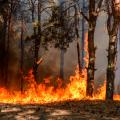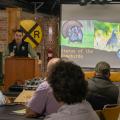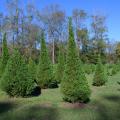How does the study of Forest Genetics improve tree species?
Forest genetics is the study of hereditary variation in trees. Like all living organisms genes control the traits that trees exhibit. Pines, oaks, maples, etc. have unique compliments of genes that define the species. The individual tree that grows in the forest is a product of its genes and the environment in which it lives. Just as genetics can be used to improve the milk production of dairy cattle, the hunting ability of dogs, or the grain production of a corn variety, genetics can be used to improve the characteristics of trees.
Tree improvement is the application of forest genetics to field practice. Tree improvement work is accomplished by testing wild tree selections and determining which will grow best when planted on certain sites or in specific geographic locations.
Tree improvement is a long-term endeavor because trees are long-lived organisms, and breeding programs rely on seed production that often comes in later stages of tree life. Various techniques have been developed, however, to cause some tree species to produce seed earlier. These include grafting and cultural practices like root pruning.
Many landowners in the southern U.S. have heard and use the expression "Super Pine" for pine seedlings that have been produced by a tree improvement program. These trees are seedlings grown from seed produced by parent trees that have been selected for superior form, growth rate, and other characteristics. These "superior seedlings" may be from forest industry or state agency tree programs. "Improved seedlings" have become much more available in the last decade, and these seedlings are being widely planted because on average, they grow 10% faster (or more) than "woods run" (average wild stock) seedlings.
Tree improvement programs and forest genetics research have been conducted throughout the world since about the 1950s. Generally, tree improvement programs for the conifer species were begun earlier because of their economic value and the fact they are more frequently planted. Scots pine, Norway spruce, Loblolly pine, European Larch, Eastern White pine, White spruce, Red spruce, and Douglas-fir are good examples. Tree improvement projects with broadleaf tree species have also been underway for at least 20 years. Some of the "hardwood" tree species in tree improvement programs around the world include black walnut, sugar maple, birches (black, yellow, and paper), European black alder, white ash, poplars, willows, northern red oak, and eucalyptus.
The most widely available improved tree seedlings to Mississippi landowners are "improved" pine, principally Loblolly pine. These trees can be purchased from the Mississippi Forestry Commission or forest industry nurseries such as Weyerhaeuser or International Paper Co. Landowners purchasing seedlings should be sure to match the seed source of the seedlings with the planting locality.
For more information on forest genetics and tree improvement check the following references:
- An Introduction to Forest Genetics by Jonathan W. Wright. 1976. Academic Press, Inc., New York 463 p.
- Geographic Variation in Forest Trees by E. Kristian Morgenstern. 1996. UBC Press Vancouver, B.C. 209 p.
- A Guide to Southern Pine Seed Sources by Clark W. Lantz and John Kraus. 1987. Southeastern Forest Experiment Station, Asheville, N.C. Gen. Tech Rep. SE-43. 34 pp.
The U.S. Forest Service Seedling Nursery and Tree Improvement web site is a good source of current information and links on forest tree improvement and seedling production.
A Handy List of Forest Tree Nurseries
Publications
News
Did you know that wildfire is a common occurrence in Mississippi? If you live in the rural-urban interface – areas where human development moves into rural areas – your risk of being affected by wildfire increases.
Landowners working to improve game bird habitat can sign up for Feb. 28 and March 1 weekend events that provide practical information for property management.
The Mississippi State University Extension Service is hosting the turkey and quail management social and workshop in Shannon, Mississippi.
RAYMOND, Miss. -- Mississippians who want to deck their holiday halls with a locally grown Christmas tree will have no problem finding one. Although weather conditions have tested the state’s growers over the last two years, tree inventory is strong.




